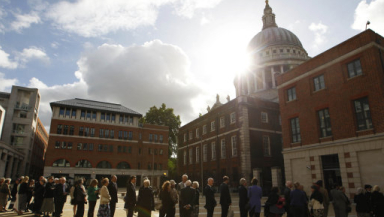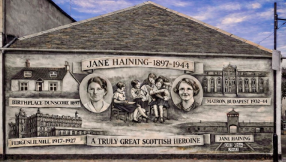
Without evangelism, the Church is going to die. This was the message from Dr John Sentamu, Archbishop of York, in his address to the General Synod of the Church of England on Monday.
He opened his speech by saying that England was in need of "re-evangelisation" to return to a previous level of general understanding and acceptance of the Gospel.
"All people in Britain experience weather, and they talk about it readily and repeatedly. If only disciples of Jesus Christ in England did the same thing about Him," he said.
Quoting the late Canon David Watson, he repeated the phrase "evangelise or fossilise" repeatedly throughout his opening speech.
At various points he compared the situation to that of the early northern English saints, Aiden, Cuthbert, Paulinus, Hilda and Chad. Their passion for things like memorisation of Psalms and direct engagement with those who did not believe, so said the Archbishop, should find new form in the 21st Century Anglican Church.
"What was it that drove these tough men?" the Archbishop asked, "…sustained by a diet of prayer, study and manual labour."
"Their discipline was rooted in sanctuary, journey and welcome," he said.
In describing the vision behind his motion on evangelism, he said he hoped to "re-create communities of prayer, worship, hospitality and care for the poor and lonely, as well as communities of proclamation".
The motion that Archbishop John Sentamu put forward would create a task force to "support Archbishops in taking forward the call to evangelism". This was based on seven principles of evangelism, listed in the motion as being:
• Prayerful discernment and listening
• Apologetics (defending and commending the Christian Faith)
• Evangelism (the initial proclamation of Faith)
• Catechesis (teaching and learning the Faith)
• Ecclesial formation (growing the community of the Church)
• Planning and forming new ecclesial communities ('Fresh Expressions' of the Church)
• Incarnational mission (following the pattern of Jesus Christ)
This mission will be accomplished by, in part, by ensuring that all local parish churches councils should be dedicating at least part of their regular meetings to questions of evangelism, with at least one meeting every year being mostly dedicated to evangelism.
Thanks to an amendment from Angus MacLeay of Rochester, this task force will contain a wide variety of church figures with a broad set of experience with church planting and turning round shrinking congregations. A further amendment from Stephen Pratt of Litchfield ensured that all congregations should be trying at least one new form of evangelism by December 2014, but an amendment to add focus to young people proposed by Gavin Oldham of Oxford was defeated, after it was argued that it would dilute rather than enhance the focus.
Although the motion was overwhelmingly carried, there was some substantial questioning and debate about the specific focus of the motion, as well as the detail of how everything is going to work. Mark Ireland, of Lichfield, pointed out that the motion did not in any way mention how, if at all, any efforts launched by this motion were to be funded. The general character of the discussion seemed to suggest, although not explicitly state, that this would be a matter for individual churches to decide. No mention of central funding was made.
Philip North, of London, garnered substantial amounts of attention from his comments about the failure of the Church to reach out to poorer communities. "The battle for the heart and soul of this nation will not be fought and won in Guildford or Kensington," he said, and provided details of the complete absence of applicants for a parish in a deprived council estate dominated area, compared to an overflowing stream of over 100 applicants to take over the role of an affluent parish in Paddington.
Dagmar Winter, of Newcastle, echoed this point, saying that there was a danger that in talking about "re-evangelising" and "re-creating" Christian communities, when in fact the kinds of communities the Archbishop of York talked about may have in fact have never existed. Some were worried that the Church could end up idealising a kind of middle class mythologised Christian community that would push more people away than it would attract.
Others in the debate commented on the fact that new evangelism has to work in a very different context, both from the past and depending on where you go in the country. Some groups commented on the fact that evangelism will not work without further community outreach programmes, such as mother/father and toddler groups. Others reminded the Synod that evangelists cannot rely on the same kind of expected background knowledge about Christianity that was more widely present in the UK 50 years earlier.
Archbishop Sentamu sought to liberate the words "evangelical" from any specific group or set of practices. He praised in one example a chat show style apologetics exercise in South Nottinghamshire called "the Gap", and the need to move people on from being merely "converts" and into being "disciples". The Great Commission, the Archbishop of York argued, was universal. "Every Christian may not be an evangelist but every Christian is a witness," he said.













